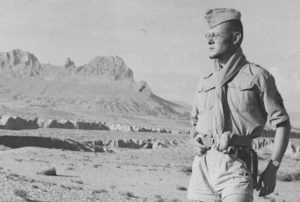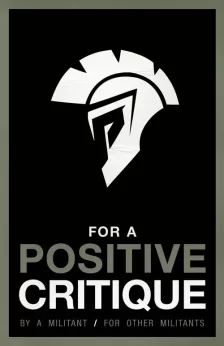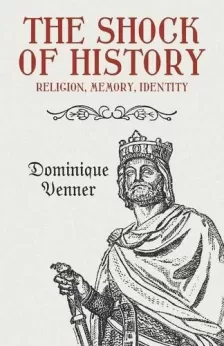A decade ago, on May 21, 2013, in the heart of the Notre Dame Cathedral in Paris, the great writer Dominique Venner committed suicide.
Brought into existence under a lonesome moon in the year 1935, Venner took his first breath, his destiny twined with the tendrils of French history, fated to tread its winding, fog-laden paths and to imprint his own unique silhouette onto the ever-shifting dunes of chronology. His role in life was not that of a mere observer; nay, he was an active participant in the great drama of existence, occupying various roles such as historian, journalist, and essayist. His pen flowed freely on subjects of political and military history, often focusing its gaze upon the grim face of conflict and warfare. He was a man born of the old world, yet destined to confront the tumult of the new.
 In the throes of his youth, Venner was swept into the stormy sea of the Algerian War of Independence, finding allegiance with the Organisation de l’armée secrète (OAS), a band of French dissidents who formed a shadow army during this turbulent period of history. As the chapters of his life turned, Venner elected to retreat from the frontline of political activism, instead dedicating his energies to the noble pursuit of history. He became a chronicler of time, an architect of thought, constructing narratives ranging from the rustic allure of hunting to the rich tapestry of European history and traditions. His voice, albeit controversial, rang loud and clear in the halls of intellectual discourse, critiquing the modern world and advocating passionately for the preservation and celebration of Europe’s ancestral heritage.
In the throes of his youth, Venner was swept into the stormy sea of the Algerian War of Independence, finding allegiance with the Organisation de l’armée secrète (OAS), a band of French dissidents who formed a shadow army during this turbulent period of history. As the chapters of his life turned, Venner elected to retreat from the frontline of political activism, instead dedicating his energies to the noble pursuit of history. He became a chronicler of time, an architect of thought, constructing narratives ranging from the rustic allure of hunting to the rich tapestry of European history and traditions. His voice, albeit controversial, rang loud and clear in the halls of intellectual discourse, critiquing the modern world and advocating passionately for the preservation and celebration of Europe’s ancestral heritage.
In the vortex of ideological thought, Venner stood as a pillar among the founders of the French New Right movement. This intellectual conclave, often associated with the Groupement de recherche et d’études pour la civilisation européenne (GRECE), was akin to a lighthouse, casting the beam of a distinct, pan-European identity onto the foggy shores of a rapidly changing world. However, even from this movement, Venner would distance himself, instead retreating to the comfort of his historical research and writing, the quiet sanctuary where his thoughts could soar.
The canon of Venner’s work is broad and varied, each piece a testament to his intellectual prowess and fervor for historical understanding. Armed with his scholarly quill, Venner confronted the eerie echoes of World War Two in Histoire de la Collaboration, tracing the intricate labyrinth of France’s collaboration with National Socialist Germany. Rather than merely reiterating this tale, he bravely delved beneath its surface, challenging the mainstream narrative. His Histoire critique de la Résistance mirrored this approach, slicing through the veneer of the conventional portrayal of the French Resistance to expose the concealed facets of this symbol of national defiance. Venner’s pen, akin to a historian’s scalpel, meticulously deconstructed these narratives, illuminating the convoluted veins of truth that lurk beneath the surface of accepted wisdom.
Venner’s literary explorations carried him over the expanse of the Atlantic, where he found himself standing upon the battle-scarred fields of Gettysburg. This landscape, forever seared with the memory of civil war, was a theater wherein the thunder of artillery fire still lingered, their ghostly resonance felt through the passage of time. His pen traced the story of this blood-sanctified ground, conjuring an image of history so vivid it felt as if the thunderous cacophony of the battle could be heard anew.
Venturing further, Venner extended his grasp to encompass the history of firearms – artifacts of metal and wood that have, over centuries, altered the course of history, shaped societies, and, for better or worse, defined the human experience. His work on this subject reflects the hues of his own convictions: conservative and traditionalist. Here, too, his words sought to peel back the layers of history, exploring the symbiotic relationship between mankind and these instruments of power and conflict. He painted a picture of a past intertwined with the evolution of these tools of warfare.
Before the mists of disillusionment swathed his being, and before he withdrew to the tranquil embrace of rural existence where he would eventually pen the lion’s share of his historical and metapolitical musings, Dominique Venner was deeply entrenched in the struggle for French Algeria – a struggle that cast long shadows both during the war and in its haunted aftermath. Entwined within the cryptic machinations of the OAS, his fate took a dark turn as he found himself within the chilling grasp of incarceration after taking part in the storming of the headquarters of the French Communist Party in Paris.
It was within the oppressive confines of his prison cell that Venner sought refuge in the written word. His endeavor? A monumental task to weave the diverse tapestry of right-wing thought into a singular, cohesive political doctrine, a manifesto that mirrored the intent and influence of Vladimir Lenin’s incisive text What is to be Done?
The resultant creation, For a Positive Critique, emerged from this intellectual crucible, much like a phoenix rising from the ashes of despair. It was the kernel from which sprouted his future metapolitical ventures, bearing fruition in Europe-Action, GRECE, and Iliade.
As the shadows lengthened on the sundial of his life, Venner gazed upon the world with a critical eye, expressing increasing concern for what he perceived as the destructive forces of globalism and multiculturalism. This malaise would ultimately lead him to his tragic demise. His departure from this world was not silent; he left behind a note expressing his profound worries for the future of France and Europe. His death stirred the tranquil pond of public consciousness, causing ripples of controversy and attention that touched both France and lands beyond her borders.
Venner’s life is a tale of a man’s journey through the labyrinth of history, a narrative marked by confrontation, contemplation, and, ultimately, a tragic conclusion. Although subject to critique and debate, his writings and views have carved a niche in the annals of French intellectual thought, continuing to provoke dialogue and reflection even beyond his passing. The soul of Venner continues to reverberate through the corridors of contemporary thought. His spirit, imbued in the pages of his many works, persists in challenging, provoking, and evoking a sense of longing for a past that often seems at odds with the relentless march of modernity.
The tome of Le siècle de 1914 (The Century of 1914) serves as a testament to Venner’s in-depth dissection of the upheavals of the twentieth century. War, revolution, technological advances, the rise and fall of ideologies – he captures the force of a century that forever altered the course of human history, presenting an unforgiving but profoundly insightful look into the heart of the storm.
 Yet it is perhaps in The Shock of History: Religion, Memory, Identity that Venner’s ideological ethos shines the most brilliantly. Here, he weaves a narrative thread that connects religion, memory, and identity, arguing that these forces have shaped Western civilization and its people in ways that often go unnoticed. He proposes that the “shock of history” can jolt individuals and societies into self-awareness, a concept that is critical for understanding the present and projecting the future.
Yet it is perhaps in The Shock of History: Religion, Memory, Identity that Venner’s ideological ethos shines the most brilliantly. Here, he weaves a narrative thread that connects religion, memory, and identity, arguing that these forces have shaped Western civilization and its people in ways that often go unnoticed. He proposes that the “shock of history” can jolt individuals and societies into self-awareness, a concept that is critical for understanding the present and projecting the future.
In the abyss of global discourses, where a multitude of ideas and ideologies clash and coalesce, Venner’s ideas swim against the ubiquitous currents of modern thought. With a will as unyielding as the ancient monoliths of yore, he stood in resolute critique of the twin Leviathans of multiculturalism and globalism, those chimeric entities of the modern age that threaten to consume the distinct, unique character of different societies. His heart played a sonnet of yearning for a pastoral past, an idyllic era untouched by the frenzied pulse of modernity. He was an ardent advocate of a Europe that stood firmly upon the bedrock of its ancestral traditions, a continent that sang the ballads of its history without the muddying influences of alien elements.
Such notions, far removed from the popular acceptance of contemporary degeneration, found their mark in the minds of many, for their resonance was undeniably potent. There was an alluring power in his assertions, a raw energy that drew from the primordial essence of cultural identity. He did not merely articulate his thoughts; he scribed them into the intellectual landscape of his era, indelible etchings in the granite of academic discourse. Venner’s ideological fabric, meticulously interlaced with strands of staunch traditionalism, a damning rejection of worldwide homogenization, and a wistful longing for a seemingly vanished utopia, has imprinted an indelible and potentially irreversible mark upon our collective consciousness. The edifice of his thought stands stark against the horizon of our times, a monument to an intellectual titan whose ideas continue to have their influence felt in conservative works and beyond.
It was in the hallowed heart of the Notre Dame Cathedral, amidst the murmur of countless prayers and beneath the watchful gaze of stone saints, that the life of Dominique Venner met its tragic, self-inflicted end. Yet, death was not a full stop for Venner. His legacy, bound within the confines of his extensive writings, continues to breathe, challenging us to question, reflect, and above all, remember.
Indeed, the reflection of Venner, much like the everlasting words of Edgar Allan Poe’s raven, continues to whisper in the winds of intellectual discourse, its cry piercing the silent gloom: “Deep into that darkness peering, long I stood there wondering, fearing, / Doubting, dreaming dreams no mortal ever dared to dream before…” As we delve into his words and immerse ourselves in the depths of his thoughts, we find ourselves caught in the enigmatic dance of history, forever oscillating between yesterday’s fading shouts and tomorrow’s nascent voices.










Venner is a true European hero. His legacy lives on.
I really got drawn into this history of Venner. Constantin did him justice..
I wonder how he would feel about the state of French nationalist and national revolutionary groups today?
France has a stellar tradition of European rightwing movements. The Idenitarians are extremely interesting although the last few years they seem to have lost momentum.
The story of the OAS needs to be properly told in English and not forgotten.
I’d argue that was the breeding ground of what would become the New Right.
Extremely interesting movement. Also about the French Foreign Legion who tried to overthrow the treacherous French state.